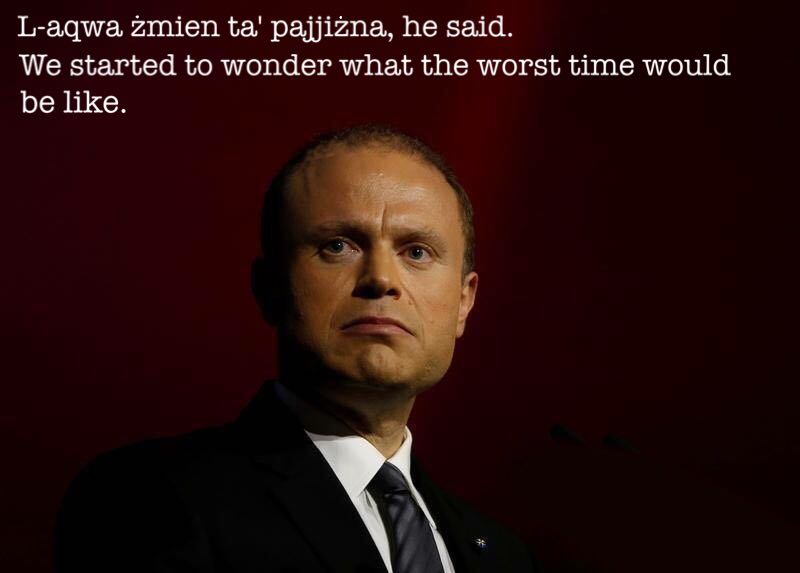GUEST POST: Betrayal of a nation
This guest post has been written by a Maltese woman who works in financial services.
Joseph Muscat was elected in 2013 to head the government of a country that prospered in the face of the severe recession that raged in much of the globe. Malta’s economy flourished largely on the basis of its financial services and gaming industries, which relied in turn not only on tax advantages but also on the impeccable reputation and sound regulation which backed them up.
The businesses established in Malta are in the main subsidiaries of major corporations in other EU member states. Their identity is not hidden or disguised in any way, and they chose to be based here in Malta in part because of its reputation and its status as an EU member state. Malta is no Panama – its business model is entirely different.
In 2013, Malta faced external challenges to its tax systems, mainly in terms of tax reforms being proposed within the EU. That situation is now worse. Shortly after coming to power, Muscat’s government implemented, together with Henley & Partners – which had devised a similar scheme for the dirt-poor Caribbean island of St Kitts & Nevis – a programme for the sale of EU (Maltese) citizenship that would inevitably damage Malta’s reputation. The whole edifice depended heavily on the government’s ability to preserve and enhance Malta’s credibility and to robustly defend against any improper motivation or behaviour.
Given this background, the actions of Konrad Mizzi, Keith Schembri and Brian Tonna, the Prime Minister’s closest lieutenants, in secretly forming companies in Panama, was behaviour of the utmost stupidity and gross irresponsibility. Beyond the question of the intrinsic criminality involved, they created an opportunity for Malta’s opponents to compare the country to the offshore systems operated in Panama and similar territories, a comparison that poses a severe threat to us – if it sticks, Malta’s best international businesses would exit in droves, rather than risk being tarnished by association with this country.
At a stroke, the Prime Minister’s and government’s ability to defend the status quo was severely weakened. Malta was at the same time thrust into the limelight, for the wrong reasons, to the discomfiture of all the corporations that are based here.
In many countries this would have been enough for a prime minister to resign, acknowledging that his lack of judgment in selecting his team, and his team’s actions, have weakened his ability to defend and promote Malta’s interests in a credible manner.
At the very least, the Prime Minister should have disassociated himself completely from the behaviour of his subordinates by removing them for good from the political arena, irrespective of their merits. He failed to do this, and has instead snubbed the European Parliament’s investigations into the matter. In so doing he failed himself, his supporters and his country.
What happened subsequently was predictable, and the attacks now being made against Malta, labelling it the “Panama of Europe”, are seeking to exploit the weakness that Muscat and his lieutenants themselves created, to Malta’s severe detriment. This is an assault that was obviously in the making long before the latest spate of revelations on Egrant Inc, Pilatus Bank, Schembri’s association with former Allied Newspapers managing director Adrian Hillman, his ‘loan’ to Brian Tonna and so forth.
Even if these revelations are all lies – and this appears highly unlikely – they have been afforded credibility by the behaviour and choices of the Prime Minister and his closest aides. We have witnessed Simon Busuttil and Edward Scicluna protesting that Malta is no Panama, but the Prime Minister keeps a step back on this comparison, knowing that any protestations on Panama uttered by him would invite obvious retorts. He is no position to defend Malta’s interests on a subject of vital importance.
The situation that this country now finds itself in is a very serious one. The foreign corporations resident here will not wait for ‘proof’. They are not electors desperate to believe Joseph Muscat. Malta is already an agenda item at their board meetings, with very serious debates currently in progress on whether an ongoing association with this country is still desirable.
Should these debates go the wrong way, the economic impact on this nation will be dire. This is not an election about choosing between economic prosperity or a clean government, but about choosing to salvage our economy or letting it go down the drain.
In the activities that are driving our economic success, reputation and success are inseparable. Indeed, in this scenario our major hope is that there are people in Malta who have spoken out and who are fighting for change, and who have in the process retained the credibility we desperately need to protect our status.
I do not doubt that the Prime Minister knows all this, but he has cynically decided to call a general election (disrespecting Malta’s role re the presidency of the EU council), seeking to use the electorate as a shield for his cronies and himself. He does not care that his re-election will be seen by all investors, and by overseas and Maltese commentators alike, as signifying a country without a sound moral fibre.
He does not enlighten his supporters as to how the tangible economic wellbeing they are experiencing hangs on a knife-edge, depending on the possibility of Malta somehow regaining its reputation, that some irreversible damage has occurred already, even if its impact will take some months to filter through. Neither does he care that he is no longer suited to defend Malta’s interests.
The list goes on, and inevitably leads a reasonable person to the conclusion that Muscat’s bid to retain power, and the gross betrayal of the nation that it represents, must be motivated by a wish to suppress the consequences of wrongdoing. Four years ago he misled the voters who trusted him. He is now seeking to turn them into unwitting accomplices.

